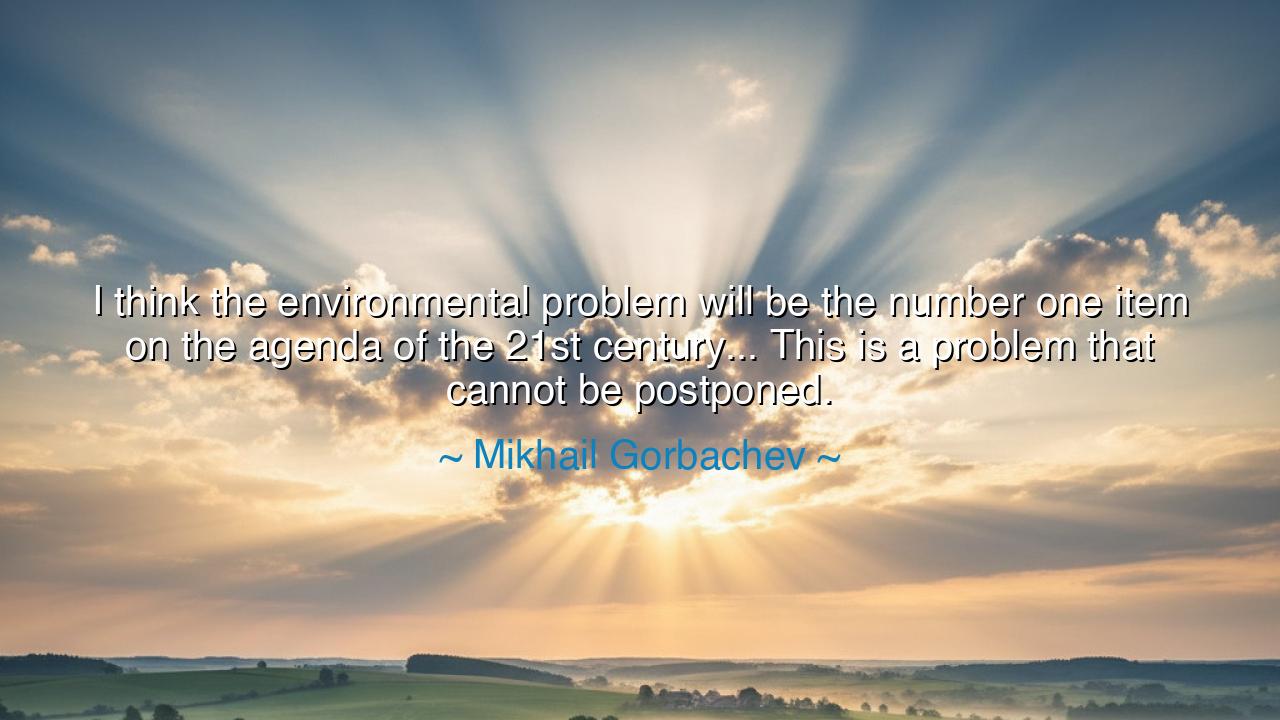
I think the environmental problem will be the number one item on
I think the environmental problem will be the number one item on the agenda of the 21st century... This is a problem that cannot be postponed.






When Mikhail Gorbachev declared, “I think the environmental problem will be the number one item on the agenda of the 21st century... This is a problem that cannot be postponed,” he was speaking as one who had seen the rise and fall of empires — and yet understood that the greatest battle of all was not between nations, but between humanity and its own shortsightedness. His words were not the rhetoric of politics, but the warning of a statesman who had glimpsed the deeper truth of civilization: that no economy, no ideology, no power can survive on a dying planet.
The origin of this quote can be traced to Gorbachev’s later years, after the dissolution of the Soviet Union, when he turned his attention from geopolitics to the fate of the Earth itself. Having witnessed the environmental degradation wrought by decades of industrial excess — the poisoned rivers, the withering forests, the silent collapse of ecosystems — he realized that the Cold War’s greatest casualty was not ideological, but ecological. In 1993, he founded Green Cross International, dedicating himself to global cooperation on environmental protection and sustainable development. His words about the environmental problem were thus born from experience: a leader who had once governed a superpower now warning that power itself would mean nothing if humanity failed to safeguard its home.
When Gorbachev said this was a problem that “cannot be postponed,” he was speaking to the essence of time — that most relentless of forces. Throughout history, mankind has been gifted moments of awakening, brief windows where awareness meets opportunity. Yet too often, we postpone action, believing the Earth’s patience to be infinite. Gorbachev understood what few dared to say aloud: that the ecological crisis is not a distant storm, but one already upon us. Every year of delay, every forest burned and glacier melted, draws the world closer to a point beyond redemption. To postpone, he warned, is to perish.
The ancient thinkers would have understood his urgency. The Greeks spoke of hubris, the pride that drives mortals to challenge the gods — and the punishment that follows. In our time, hubris takes the form of unchecked consumption, the belief that human mastery can rewrite the laws of nature. Yet nature, like the gods of old, is patient but not merciful. Consider the tragedy of the Aral Sea, once the fourth-largest lake on Earth, now reduced to dust and salt by reckless irrigation policies of the Soviet era. What was once a sea became a desert, what was once life became ruin. Gorbachev knew this story intimately — it was his people who suffered its consequences. Thus, his call was not merely political, but profoundly moral: a call to humility before the living Earth.
There is a lesson in his foresight, one that echoes across the ages. The environmental crisis is not merely about pollution or resources — it is about the human soul. It asks whether we are capable of restraint, of reverence, of foresight. Each generation inherits the Earth not as a possession, but as a sacred trust. To honor that trust is to act — to heal what has been harmed, to protect what still endures, and to remember that prosperity built on destruction is but illusion. Gorbachev’s insight was that the 21st century would test not our wealth, but our wisdom.
The lesson of his words is both clear and demanding: do not wait. Every act of care — a tree planted, a law passed, a lifestyle simplified — becomes a stone laid in the foundation of the world to come. The work of healing the planet is not reserved for governments or experts; it belongs to every person who breathes its air and drinks its water. The ancients taught that duty to one’s homeland was the highest virtue. Today, our homeland is the Earth itself — vast, wounded, and waiting for its guardians to awaken.
So let Gorbachev’s warning stand as a torch for the generations that follow: the time for postponement has ended. The seas rise, the forests fall, and the climate trembles beneath the weight of human ambition. But it is not too late for courage. If each nation, each leader, and each soul chooses care over conquest, humility over hubris, restoration over ruin — then the 21st century, though born in crisis, may yet become the century of renewal. For the Earth is patient, and if we act with wisdom, she will forgive — but only if we begin now.






AAdministratorAdministrator
Welcome, honored guests. Please leave a comment, we will respond soon